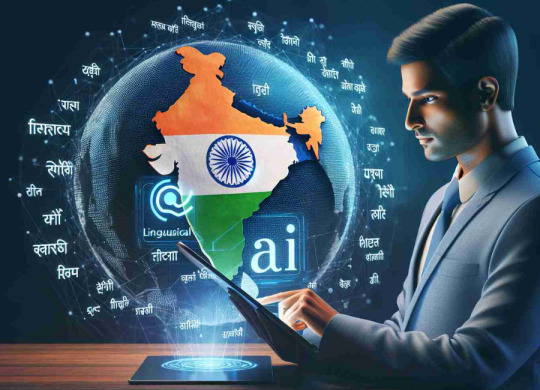Don't wanna be here? Send us removal request.
Text
The Future of Artificial Intelligence in India: Innovation, Growth & Opportunity
Introduction
The Future of Artificial Intelligence in India is on the cusp of a digital transformation, and artificial intelligence (AI) is at the heart of this revolution. From agriculture to healthcare, manufacturing to education, AI is not only reshaping industries but also redefining how we live and work. As one of the fastest-growing economies with a burgeoning tech ecosystem, India is uniquely positioned to leverage AI for inclusive and sustainable growth.
In this blog post, we’ll explore the current state of artificial intelligence in India, examine emerging trends and innovations, and predict how AI will profoundly influence India’s future.
The Current Landscape of AI in India
India’s AI journey officially gained momentum with the release of the National Strategy for Artificial Intelligence by NITI Aayog in 2018. The strategy identified five key sectors for AI adoption: healthcare, agriculture, education, smart cities, and smart mobility.
Key developments include:
Government Initiatives: Programs like AI for All, Responsible AI for Youth, and IndiaAI Mission aim to democratize AI education and promote ethical usage.
Startup Ecosystem: India is home to over 3,000 AI-focused startups (as of 2024), with hubs in Bengaluru, Hyderabad, Pune, and Delhi NCR.
Academic Collaboration: Institutions like IITs, IISc, and IIITs are working on cutting-edge AI research, often in partnership with global tech giants.
Despite the progress, challenges remain: a shortage of skilled professionals, inadequate data infrastructure, and limited investment in core AI research.
Emerging Trends and Advancements in Indian AI
1. Natural Language Processing (NLP) in Regional Languages
India’s linguistic diversity is a unique challenge—and opportunity. Startups and research labs are working on AI models that understand and generate text in languages like Hindi, Tamil, Bengali, and Marathi.
Project Bhashini, led by MeitY, is building a national language translation mission to bring digital inclusivity to millions.
2. AI in Healthcare
AI is revolutionizing diagnostics, drug discovery, and patient care:
Niramai uses AI for early-stage breast cancer detection using thermal imaging.
Qure.ai provides AI-driven radiology solutions and is deployed in both urban hospitals and rural clinics.
This trend is particularly significant given India’s doctor-to-patient ratio, which is lower than the WHO recommendation.
3. Smart Agriculture with AI
Farmers are using AI-based solutions for crop monitoring, pest detection, and yield prediction.
Startups like CropIn and SatSure are integrating AI with satellite imagery to help farmers make informed decisions, enhancing productivity and minimizing losses.
4. AI in Governance and Public Services
The Indian government is increasingly using AI for predictive analytics in areas like crime prevention, traffic management, and citizen grievance redressal.
In Telangana, the TSCOP app leverages AI to enhance law enforcement efficiency.
The Future of AI in India: Predictions and Possibilities
AI as a Catalyst for Inclusive Growth
AI has the potential to narrow socioeconomic gaps—if deployed ethically. By automating mundane tasks, it can free human resources for creative and strategic roles, and uplift rural communities through accessible tech.
India as a Global AI Hub

With its young workforce (median age ~28 years) and growing pool of STEM graduates, India could emerge as a global leader in AI innovation and services, particularly in areas like AI ethics, low-resource language models, and affordable AI solutions.
Workforce Transformation
The rise of AI will inevitably lead to job displacement in repetitive, low-skill sectors, but it will also create new roles—AI trainers, ethicists, prompt engineers, and explainable AI experts.
Reskilling will be vital. Initiatives like the FutureSkills Prime by NASSCOM are already paving the way.
Fusion of AI with Emerging Tech
The convergence of AI with blockchain, IoT, and quantum computing will open new frontiers. Smart supply chains, predictive maintenance in manufacturing, and AI-powered digital twins are just the beginning.
Challenges to Overcome
To unlock AI’s full potential, India must address:
Data Privacy and Ethics: Establishing robust data governance frameworks is critical, especially with the rollout of the Digital Personal Data Protection Act.
Infrastructure Gaps: Cloud access, computational power, and reliable internet are still unevenly distributed.
Bias and Fairness: AI systems trained on biased data can perpetuate inequality, making fairness and transparency essential.
Final Thoughts: A Vision for 2030
Imagine this: By 2030, AI-powered personal tutors will teach students in their native language, real-time health diagnostics will be available in the remotest villages, and AI governance systems will make cities cleaner, safer, and more efficient.
India stands at a crossroads. With strategic investment, ethical foresight, and collaborative innovation, AI can be more than just a tool—it can be a transformative force for a billion dreams.
Let’s Discuss!
What’s your take on AI’s role in shaping India’s future? Are we moving too fast or not fast enough? Drop your thoughts in the comments—we’d love to hear from you.
0 notes